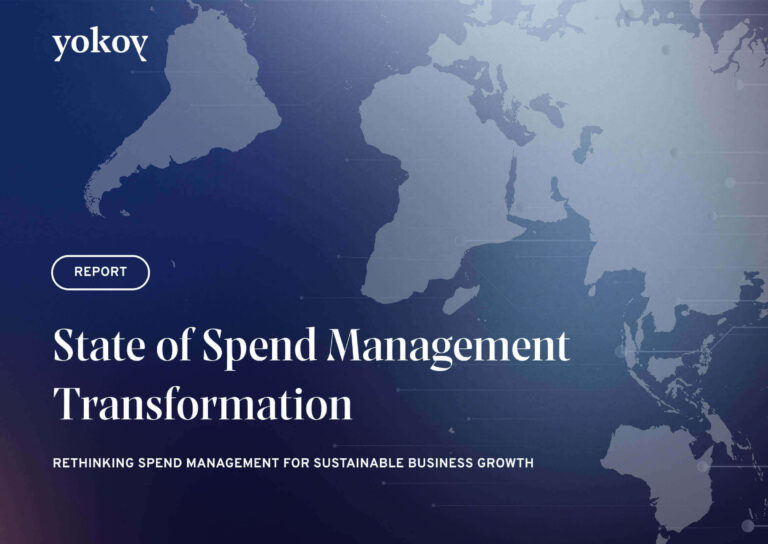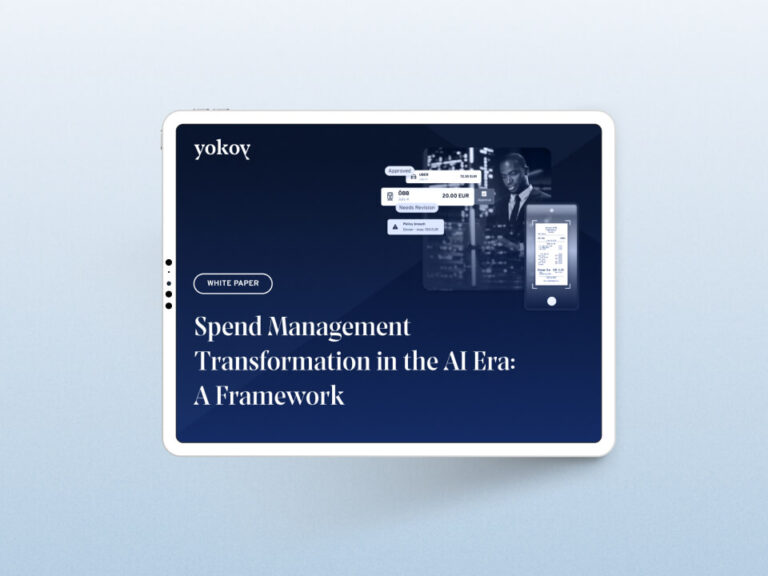Home / The Game-Changing Potential of AI in Finance Transformation
The Game-Changing Potential of AI in Finance Transformation
- Last updated: May 25, 2023
- AI in finance, Finance transformation


Co-founder & CMO, Yokoy
With the rise in popularity of generative AI technologies like Chat GPT, more and more companies are looking at ways to incorporate artificial intelligence into their daily routines.
Across departments, AI is seen as a potential game changer in times of crisis, as it can help teams work more efficiently and be more creative when problem solving.
But while the rapid adoption of AI technology is driven by the generative aspect of it, it’s the intelligence layer of artificial intelligence that can help organizations gain competitive advantage by working smarter.
So in this article, I’ll focus on the impact of artificial intelligence on the digital transformation of the Finance function. However, the principles I’ll state below apply to virtually all other departments.
The finance function in transition: From digitalization to transformation
"The transformation of the finance function will require finance professionals to develop new skills and competencies, such as data analytics, digital strategy, and innovation management."
Melanie Gabriel, CMO of Yokoy
In recent years, the finance function has undergone a profound transformation as a result of digitalization.
From automation to artificial intelligence, technology has played an increasingly important role in the finance industry, enabling finance professionals to work more efficiently, accurately, and effectively.
However, digitalization is just the beginning of the transformation of the finance function. In the coming years, the finance industry will need to move beyond digitalization and embrace true transformation if it is to keep pace with the changing demands of the business world.
What does this transition look like today?
At its core, it involves a shift from a focus on technology and process improvements to a focus on strategic innovation and value creation.
For example, instead of simply automating existing processes like data entry and report generation, finance teams can use AI to develop new business models, identify new investment opportunities, predict market trends, and optimize risk management strategies.
By leveraging the power of technology in this way, finance professionals can add more value to their organizations, improving financial performance and driving growth.
Of course, this transformation is not and will not be easy.
It requires finance professionals to develop new skills and competencies, such as data analytics, digital strategy, and innovation management. It also requires organizations to invest in new technologies and systems, and to create a culture that values innovation and experimentation.
But the rewards of this transformation are significant: by embracing the full potential of artificial intelligence technologies, finance professionals can redefine their role in the organization, creating more meaningful and impactful career paths.
Thus, I think it’s safe to say that with AI at the core of its processes, the finance function will undergo even deeper transformations in the coming years.
White paper
Report: State of Spend Management Transformation [2023]
This report offer a glimpse into the current state of spend management transformation and the trends, challenges, and opportunities shaping its future.

What will the AI-shaped finance function of the future look like?
"The AI-shaped finance function of the future will look profoundly different from the one of today: It will be defined by a highly collaborative process, with humans and machines working together to achieve common goals."
Melanie Gabriel, CMO of Yokoy
While there are concerns about the potential impact of AI on the job market, there is a growing recognition that AI and humans can work together to achieve better outcomes for the finance industry as a whole, with each doing what they’re best at.
To give just an example: AI-powered FP&A tools can analyze large amounts of financial data, identifying trends and patterns, and making predictions about future financial performance. Equipped with such insights, finance professionals can make more accurate forecasts, identify risks and opportunities, and make better strategic decisions.
Of course, as with any technological advancement, there are challenges associated with the adoption of AI in finance, and the concerns about job displacement or the need for new skills and training are justified.
However, research by the World Economic Forum suggests that AI may create more jobs than it displaces, particularly in areas such as data science and analysis, digital strategy, process automation, and software development.
And given the radically transformative potential of artificial intelligence, I strongly believe that the AI-shaped finance function of the future will look profoundly different from the one of today: It will be defined by a highly collaborative process, with humans and machines working together to achieve common goals.
With the integration of artificial intelligence, finance professionals will be able to effectively extract insights and recommendations from large amounts of data, using their expertise and judgment not to manipulate data, but to make the final decision.
Furthermore, I believe that the AI-shaped finance function will be highly adaptable, able to quickly respond to changing business needs and market conditions. AI algorithms will be able to learn and improve over time, becoming increasingly effective at performing complex tasks and enabling fast decision-making.
With AI-powered finance supertools at their fingertips, finance professionals will be able to provide more targeted and proactive recommendations to stakeholders, planning for the future with greater confidence.
Finally, I believe that by fully embracing the transformative potential of AI technology and making it an integral part of their daily work routine, finance professionals will be able to go back to being creative thinkers, visionary problem solvers, and empathetic relationship builders.
White paper
Spend Management Transformation in the AI Era: A Framework
In the era of AI-driven digital transformation, traditional finance processes are becoming obsolete. As companies grapple with increasing complexities and rising competition, they must recognise the transformative potential of artificial intelligence to stay ahead of the curve.

Simplify your spend management
Related content
If you enjoyed this article, you might find the resources below useful.


